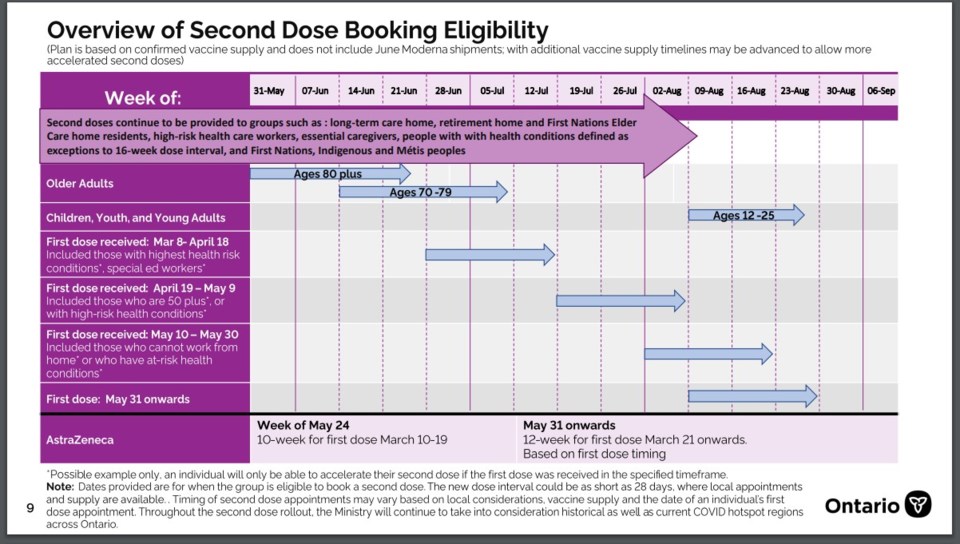Ontario residents have been told they can choose to accelerate their COVID-19 vaccine dosage interval this summer, well ahead of the planned 16-week interval that was announced earlier this year.
Details were outlined at a technical briefing on Friday where Ministry of Health (MoH) officials said residents who have received their first dose of either Pfizer BioNTech or Moderna vaccines. This follows a similar announcement made a week ago where the province said recipients of the AstraZeneca vaccines would be eligible to shorten the 16-week interval to get their second dose at either a 10-week or a 12-week interval.
One of the key reasons for the announcement is that in the coming weeks Ontario expects to receive a significantly increased supply of vaccines from the federal government, thus "expanding eligibility to more Ontarians" said the announcement. It also means moving up the dates for first doses for Ontarians aged 12 to 17 and aged 18 and older.
The earlier decision to have dosage intervals at 16 weeks was based on two factors, said ministry officials. The primary consideration was to get the limited supply of first doses out to the population and into as many people as possible, as quickly as possible.
The second factor, earlier this year, was that the supply of vaccines coming into Ontario was limited and not coming as quickly as expected.
With respect to the new decision for minimizing the interval, the MoH said for the Pfizer and Moderna second shots could be as short as 28 days. Health Canada guidelines said the interval for Pfizer and Moderna vaccines could be 21 to 28 days, respectively.
"Ontarians will be encouraged to return to the channel where they received their first dose to get their second doses, except where it is not possible or less convenient, and Ontarians may book into another channel of their choice," said the ministry official.
The new approach will allow citizens to re-schedule based on the date of their first appointment, said ministry officials.
She said citizens who took their first dose for example at a pop-up clinic should be able to just go and book at a pharmacy for their second choice.
She said many residents, such as senior citizens, may already have their second dose booked for them, based on the original 16-week plan.
"This is about being able to reschedule that second dose earlier, if they choose," said the official.
Ontario residents who received AstraZeneca as a first dose are encouraged to reschedule their second dose for a 12-week period using what the ministry calls "the first-in, first-out method" where supplies allow.
Eligible individuals are encouraged to contact the pharmacy or primary care provider where they received their first dose, said the ministry. At the same time, said officials, the pharmacies and primary care providers might already be trying to contact first-dose recipients to reschedule the second appointments.
The ministry officials made it clear the onus is on residents to rebook quicker second doses ahead of already scheduled appointments.
The ministry is encouraging residents to go to the provincial vaccine website to book online or to telephone the Provincial Vaccine Booking Line at 1-833-943-3900.
You can review the technical document showing the accelerated second-dose rollout provided by the ministry below.

Len Gillis is a Local Journalism Initiative reporter at Sudbury.com. He covers health care in Northern Ontario.
